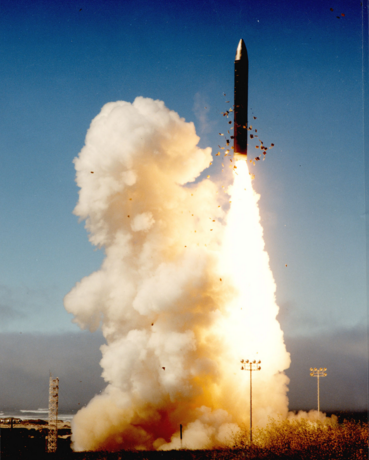North Korean Missile Launch Fails
On October 20, 2016, U.S. and South Korean militaries reported that North Korea attempted to fire a Musudan intermediate-range ballistic missile (IRBM), but the launch had ultimately failed. “North Korea launched a ballistic missile at 7 a.m. near an airfield in the northwestern city of Kusong. The missile is assumed to be the Musudan," the South Korean Joint Chiefs of Staff told the Korea Times.
This is North Korea’s second failed missile launch this week and fifth launch in the past two months. It seems to have been a failed attempt to remedy the failure of the last launch. Successfully firing one of two Musudan missiles, the regime last tested the weapons on June 22. The Musudan missile, with a range of 3,5000 kilometers (which covers the U.S. military bases in Guam), reveals an advance in North Korea’s IRBM technology.
"We remain prepared to defend ourselves and our allies from any attack or provocation. We call on North Korea to refrain from actions that further raise tensions in the region and focus instead on taking concrete steps toward fulfilling its commitments and international obligations," Pentagon spokesman Navy Commander Gary Ross said in a statement to the press.
In addition to reiterating support for regional allies, Ross also emphasized Pyongyang’s violation of international obligations, notably UN Security Council resolutions. He added, "Our commitment to the defense of our allies, including the Republic of Korea and Japan, in the face of these threats, is ironclad."
The recently accelerated launch schedule, coupled with frequent failures, demonstrates the regime’s strong desire to develop a nuclear-armed, long-range ballistic missile. North Korea has been pursuing such a program at an unprecedented pace this year. If successfully developed, the program would give North Korea the capacity to strike the U.S. mainland.
The latest Musudan launch came amidst annual security talks at the Pentagon between the United States and South Korea, where the two agreed to sustain efforts to respond to North Korea’s missile programs and reaffirmed their strong alliance. This security talk carries more significance than usual due to heightened tensions in Korea that accompanied the deployment of the Terminal High Altitude Area Defense (THAAD) system, which can shoot down short, medium, and intermediate ballistic missiles.

